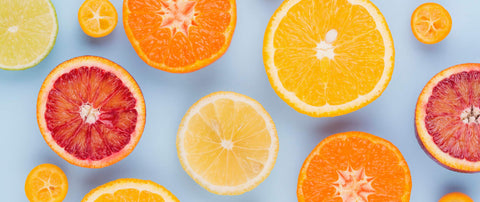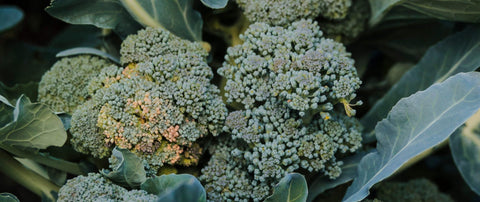Women don't exactly have it easy: hormone fluctuations during puberty, pregnancy, before and during the menstrual cycle and during the menopause are part of everyday life and often cause mood swings and physical complaints. During these phases of life, the female hormone balance is subject to particularly strong changes and stress. In this article, you will find out what exactly happens in the female body and what you should know about your hormone balance. We also give you valuable tips on how you can support your hormones naturally to increase your well-being in the long term.
Inhaltsverzeichnis
Why are hormones so important for us?
"It's probably the hormones again": pretty much every woman has heard this phrase in the course of her life. But what is this statement actually about? First of all, it is important to understand the meaning and functions of hormones in the body. Hormones are biochemical messengers in our body that transmit signals and information. They are vital and control numerous important processes in our body. These include metabolism, respiration, circulation, energy balance, our mood and reproduction.
Women and men produce the same hormones for the most part, but they occur in different quantities and have a variety of functions in their respective bodies. Women in particular are subject to greater hormonal fluctuations due to their monthly cycle. These hormonal fluctuations mean that they feel more energetic on some days and listless and tired on others. Shortly before the start of the cycle, symptoms such as anxiety, irritability and mood swings can occur. Men, on the other hand, have a constant hormone level and therefore have to struggle less with hormonal mood swings and energy chaos.
As oestrogen has a central function in the menstrual cycle, it is assumed that fluctuating oestrogen levels could have an impact on the development of depression. To this end, studies have shown that oestrogen and its receptors are crucial for the development and treatment of depression. 1 These findings suggest a link between oestrogen levels and the associated mood swings and can be used to investigate therapeutic approaches to depression.
Causes of hormonal imbalance in women
The causes of hormonal imbalance in women can have various origins. In addition to genetics, harmful environmental influences, thyroid problems and too much stress, a micronutrient deficiency as well as PMS and PCOS can also be the reasons for hormonal imbalance. A recently published article explains that important hormones such as insulin, growth hormones, ghrelin, the balance of LH and FSH, androgens and oestrogens are in an abnormal range in women with PCOS. An imbalance of these hormones is associated with diabetes, obesity and infertility, among other things. 2
As many women have a particularly sensitive nervous system, a prolonged lack of sleep can also have serious consequences for the nervous system and hormonal balance. Another important point that causes hormonal chaos in the female body is the menopause. The menopause is a very complex topic that people don't like to talk about. However, something very exciting happens in a woman's body during this time: the hormones oestrogen and progesterone drop, resulting in the absence of menstruation. In an article published in the science magazine of the University of Basel, Johannes Bitzer, a specialist in gynecology and obstetrics, says: "The menopause marks the change at which hormone-related diseases increase." These include cardiovascular diseases, a decrease in bone density and frequent bladder infections. 3 Accordingly, it is important to support the hormonal balance through a healthy lifestyle, especially in the later years.
Symptoms of hormonal imbalance
The symptoms of a hormonal imbalance are very individual and can range from mild to moderate or even severe. Severe symptoms are annoying and can even severely restrict everyday life and quality of life. If these symptoms are present, we advise you to consult a specialist and have your hormones checked:
- Strong mood swings
- Depressive mood
- Disorders in the menstrual cycle
- Severe pain before and during menstruation
- Unexplained weight gain
- Sleep disorders
- Fertility problems
- Hot flushes
- Night sweats
- Severe skin problems such as acne
- Hair loss
- Heavy body hair
Natural ways to support the female hormone balance
You can support your hormones proactively and sustainably - regardless of whether you are already experiencing symptoms of hormonal imbalance. We will show you simple yet effective measures that you can integrate into your everyday life without spending a lot of time. With these tips, you can boost your female hormone balance in a natural way:
-
Sufficient sleep
Due to the hormonal changes that occur during menstruation, pregnancy and the menopause, symptoms such as inner restlessness, hot flushes etc. can significantly disturb a woman's sleep. Sleep disturbances and more intense dreams can occur, especially after ovulation. Restful sleep is essential for our bodies, as hormones and numerous bodily functions such as the immune system and cognitive performance are regulated during sleep. To counteract sleep disorders, it is advisable to incorporate daily sleep routines and go to bed at the same time. An afternoon nap, which should not last longer than 30 minutes, can also help to combat tiredness during the day. Fatty and hard-to-digest foods in particular should not be eaten before bedtime. If you have persistent and serious sleep problems, we advise you to consult a doctor.
-
Moderate training
Too much sport is not always the best solution. Many people ignore the fact that too much strength and cardio training can drive up cortisol levels enormously. Cortisol is a stress hormone that is responsible for the accumulation of fat in the abdominal area, also known as visceral fat. This fat can be troublesome for many and, more importantly, unhealthy. A particular phenomenon has been observed in professional female athletes in particular: Relative Energy Deficiency in Sport (RED-S). This occurs when energy intake is significantly in deficit in relation to energy intake and consumption. This can lead to enormous hormonal disturbances and symptoms such as the absence of menstruation, as well as cardiovascular dysfunction and depression. 4 Many women are therefore recommended a combination of Pilates, yoga, HIIT and moderate strength training. However, HIIT and cardio training should only be done in moderation to avoid overloading the body and negative effects on the hormone balance.
-
Antioxidant diet and high-fiber diet
Antioxidant nutrition can help the body to fight free radicals. Free radicals can be caused by the body's own processes, but also by external influences. Many types of fruit and vegetables as well as oilseeds and nuts provide high levels of antioxidants. Foods that are particularly rich in antioxidants include walnuts, chia seeds, broccoli, green grapes, carrots, lettuce, kale, berries and apples. A high-fiber diet is also important to create hormonal balance.

-
Healthy fats
Omega-3 fatty acids are among the healthy fats. These fatty acids cannot be produced by the body and must therefore be obtained from food. Omega-3 fatty acids are essential for supporting the cardiovascular system, brain function and have an anti-inflammatory effect. Foods with an omega-3 fatty acid content include salmon, linseed oil, rapeseed oil, spinach and avocado.
-
Complex carbohydrates
Complex carbohydrates are digested more slowly and therefore ensure a sustained energy supply. The result: you feel fuller for longer. Complex carbohydrates are found in wholemeal products, rice and nuts, among other things. Unlike "bad" carbohydrates, complex carbohydrates generally do not trigger inflammation in the body. Inflammation in the body is often the reason why the hormone balance can become unbalanced.
-
No processed food
Processed foods - especially large amounts - are harmful to your body in every way. They can lead to inflammation in the body, affect digestion and blood pressure, but also disrupt hormonal balance. As a result, hormone production and regulation can no longer function properly, which can lead to thyroid problems, disruptions in the menstrual cycle and, in the worst case, fertility problems. Therefore, try to use more natural products.
-
Proteins and blood sugar
Proteins are very important for both muscles and hormones, as they are partly made up of proteins. This is essential for new muscle formation and maintenance. Proteins can also stabilize blood sugar levels, as a stable blood sugar level in the morning is crucial for the energy supply for the rest of the day. This also prevents unwanted food cravings. Many people already eat in such a way that their blood sugar levels remain constant. The glycemic index (GI) can be consulted for this. This shows how much a carbohydrate-containing product causes the blood sugar level to rise. For example, white flour bread has a high glycemic index, while lentils have a low glycemic index.
-
Nutrition with natural oestrogens
Some plant foods contain plant hormones known as phytoestrogens. These are similar to the female sex hormone oestrogen. In addition to their antioxidant properties, they are often recommended for hormonal imbalances and to alleviate symptoms during the menopause. Foods that contain phytoestrogens include linseed, sunflower seeds, lentils, chickpeas, beans, apples, carrots and walnuts.
-
Stress management
Stress can not only throw our hormones out of balance, but can also weaken our immune system and cause illnesses such as cardiovascular disease if it persists. It is therefore extremely important to listen to your body and think about yourself in stressful situations. Above all, stress can lead to an increase in the release of the stress hormone cortisol. This in turn can upset our hormone balance. Try to avoid stress as much as possible and focus more on relaxation techniques instead.
-
Relaxation techniques
Relaxation techniques such as yoga, meditation, breathing exercises, progressive muscle relaxation or sound and fragrance therapies can have a significant impact on the female hormonal system. These methods help the body to reduce cortisol levels and promote the production of happiness hormones such as serotonin and endorphins. A lower stress level thus contributes to a better hormonal balance.
-
Less caffeine
Drinks containing caffeine often lead to physical restlessness. This is due to the increase in the stress hormone cortisol, which is promoted by caffeine. Women during menstruation or the menopause are particularly sensitive to caffeine. Symptoms such as hot flushes and intense inner calm can also occur. To avoid this, a reduced caffeine intake should be considered.
-
Intestinal health
The majority of hormones are produced in the gut, which is why the gut is one of the most important organs for humans. In addition to digestive disorders, a poor microbiome can also lead to a hormonal imbalance, so it is important to always support the microbiome with "good" bacteria to keep your immune system and hormones in balance. You can support your microbiome with fermented fruit and vegetables, kefir, bananas, fiber, healthy fats, herbs and spices.
-
Dietary supplements and herbal support
Nature has gifted us with numerous nutrient-rich plants, fruit and vegetables. So why shouldn't we fall back on these natural helpers? Many plant varieties have long been used to create helpful dietary supplements that can support you. Here are a few indispensable helpers from nature that support the female hormone system in a natural way:
Monk's pepper: Monk's pepper has been touted for centuries as a remedy for premenstrual relief, fertility enhancement and cycle regulation. As part of a meta-analysis, numerous clinical studies were included to evaluate the effectiveness of monk's pepper for PMS (premenstrual syndrome). Studies were examined in which the researchers compared specific monk's pepper products with a placebo. They found that women who took monk's pepper were 2.57 times more likely to experience an improvement in their symptoms than those who took the placebo. This confirms that monk's pepper can be effective in relieving PMS symptoms. 5
Ashwagandha: Ashwagandha is another plant that has been used in traditional medicine for thousands of years. Ashwagandha is known for its anti-stress, anti-inflammatory and antimicrobial properties. Several studies published between the years 2010 and 2023 were analyzed to find out whether and to what extent ashwagandha can help maintain the hormonal system. The results showed that ashwagandha can have positive effects on the endocrine system. Improvements in the secretory function of the thyroid gland and the function of the reproductive system were also observed. 6
Red clover: Red clover is a plant that supports mature women during the menopause and postmenopause. Many women take red clover alongside a balanced diet during this transitional phase and swear by its ability to alleviate symptoms. One study found that red clover has a positive effect on the blood values of post-menopausal women. 7
Yam root: The yam is considered to be particularly effective in traditional medicine and is used by women to alleviate hormonal complaints, especially during the menstrual cycle and menopause. Yam root is known for its positive effects in supporting hormonal balance and is often considered as a natural alternative to hormone therapy. Fittingly, a study reported that a new protein called DOI, extracted from the Chinese yam, can be used to treat menopausal syndrome, but without side effects. It supports the release of estradiol and progesterone. It can also have a positive effect on mental performance. 8
Siberian rhubarb: Siberian rhubarb has also been used for many years as a remedy to relieve symptoms during the menopause. Siberian rhubarb is used to support hormonal balance.
Lady's mantle: Lady's mantle is often used for menstrual cramps, PMS and to support fertility. Lady's mantle is also traditionally used to support general well-being by having a stress-relieving and calming effect.
Our product N°22 PWR
N°22 PWR convinces with its natural ingredients such as Siberian rhubarb, yam, monk's pepper and lady's mantle. These plants have long been known to support well-being during the menstrual cycle and hormonal balance. The iron, folic acid and vitamin B12 contained in the product support mental function, promote blood formation, help to reduce tiredness, contribute to energy metabolism and support the normal function of the nervous system. Red clover and sage, which are considered to promote relaxation, have also been added to N°22 PWR.
Anzeige

Our product N°23 MENO BALANCE
N°23 MENO BALANCE contains the concentrated power of nature: with plant extracts of yam root, Siberian rhubarb and valerian for that extra dose of calm, it is a natural option for women over 45. It contains magnesium and vitamin B12 to support muscle and nerve function. The whole thing is rounded off with the addition of iron and folic acid.
Anzeige

Conclusion
Every woman is unique, so it is important to listen to your body's signals and respond to your personal needs. Hormonal imbalance is an acute problem and unfortunately affects a large number of women. Nevertheless, a balanced diet, the use of supplements and a healthy lifestyle can support both the hormonal system and general well-being.
Sources:
-
Sun Q, Li G, Zhao F, Dong M, Xie W, Liu Q, Yang W, Cui R. Role of estrogen in treatment of female depression. Aging (Albany NY). 2024 Feb 2; 16:3021-3042 . https://doi.org/10.18632/aging.205507
-
Yang J, Chen C. Hormonal changes in PCOS. J Endocrinol. 2024 Feb 15;261(1):e230342. doi: 10.1530/JOE-23-0342. PMID: 38285626.
-
Universität Basel. (2023, Februar 1). Die ältere Frau und die Hormone. Universität Basel. https://www.unibas.ch/de/Aktuell/Uni-Nova/Uni-Nova-132/Uni-Nova-132-Die-aeltere-Frau-und-die-Hormone.html
-
Cabre HE, Moore SR, Smith-Ryan AE, Hackney AC. Relative Energy Deficiency in Sport (RED-S): Scientific, Clinical, and Practical Implications for the Female Athlete. Dtsch Z Sportmed. 2022;73(7):225-234. doi: 10.5960/dzsm.2022.546. Epub 2022 Nov 1. PMID: 36479178; PMCID: PMC9724109.
-
Csupor D, Lantos T, Hegyi P, Benkő R, Viola R, Gyöngyi Z, Csécsei P, Tóth B, Vasas A, Márta K, Rostás I, Szentesi A, Matuz M. Vitex agnus-castus in premenstrual syndrome: A meta-analysis of double-blind randomised controlled trials. Complement Ther Med. 2019 Dec;47:102190. doi: 10.1016/j.ctim.2019.08.024. Epub 2019 Aug 30. PMID: 31780016.
-
Wiciński M, Fajkiel-Madajczyk A, Kurant Z, Kurant D, Gryczka K, Falkowski M, Wiśniewska M, Słupski M, Ohla J, Zabrzyński J. Can Ashwagandha Benefit the Endocrine System?-A Review. Int J Mol Sci. 2023 Nov 20;24(22):16513. doi: 10.3390/ijms242216513. PMID: 38003702; PMCID: PMC10671406.
-
Terzic M, Micic J, Dotlic J, Maricic S, Mihailovic T, Knezevic N. Impact of Phytoestrogens on Serum Lipids in Postmenopausal Women. Geburtshilfe Frauenheilkd. 2012 Jun;72(6):527-531. doi: 10.1055/s-0031-1298624. PMID: 25284841; PMCID: PMC4168319.
-
Wong KL, Lai YM, Li KW, Lee KF, Ng TB, Cheung HP, Zhang YB, Lao L, Wong RN, Shaw PC, Wong JH, Zhang ZJ, Lam JK, Ye WC, Sze SC. A Novel, Stable, Estradiol-Stimulating, Osteogenic Yam Protein with Potential for the Treatment of Menopausal Syndrome. Sci Rep. 2015 Jul 10;5:10179. doi: 10.1038/srep10179. Erratum in: Sci Rep. 2015 Dec 18;5:17129. doi: 10.1038/srep17129.. Wencai, Y E [corrected to Ye, Wen-cai]. PMID: 26160710; PMCID: PMC5155516.




 DE-ÖKO-006
DE-ÖKO-006
